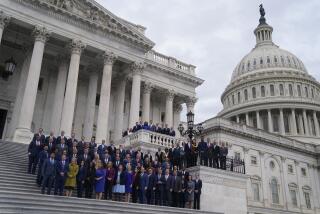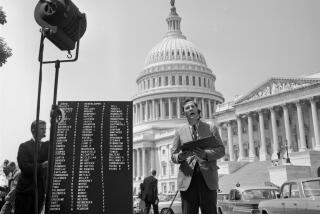Op-Ed: Heard on the Fourth of July -- from Frederick Douglass to Ronald Reagan
- Share via
Each year on July 4, Americans celebrate the nation’s founding with picnics, fireworks, music and speechifying. Noah Remnick compiled these excerpts from notable Fourth of July speeches:
Frederick Douglass, Rochester, N.Y., 1852
What, to the American slave, is your Fourth of July? I answer: A day that reveals to him, more than all other days in the year, the gross injustice and cruelty to which he is the constant victim. To him, your celebration is a sham; your boasted liberty, an unholy license; your national greatness, swelling vanity; your sounds of rejoicing are empty and heartless; your denunciation of tyrants, brass-fronted impudence; your shouts of liberty and equality, hollow mockery. Your prayers and hymns, your sermons and thanksgivings — with all your religious parade and solemnity— are, to him, mere bombast, fraud, deception, impiety and hypocrisy, a thin veil to cover up crimes which would disgrace a nation of savages. There is not a nation on the Earth guilty of practices more shocking and bloody than are the people of the United States, at this very hour.
Abraham Lincoln, Washington, 1863
How long ago is it — 80-odd years — since on the Fourth of July for the first time in the history of the world a nation by its representatives, assembled and declared as a self-evident truth that “all men are created equal.”... And now, on this last Fourth of July just passed, when we have a gigantic rebellion, at the bottom of which is an effort to overthrow the principle that all men are created equal, we have the surrender of a most powerful position and army on that very day, and not only so, but in a succession of battles in Pennsylvania, near to us, through three days, so rapidly fought that they might be called one great battle on the first, second and third of the month of July; and on the fourth, the cohorts of those who opposed the declaration that all men are created equal “turned tail” and ran. Gentlemen, this is a glorious theme, and the occasion for a speech, but I am not prepared to make one worthy of the occasion.
Susan B. Anthony, Ottumwa, Kan., 1865
We never from the beginning have had a genuine republican form of government in any state in the Union; for in no state have “the people” ever been permitted to elect their representatives. Even in Massachusetts and Vermont, the states nearest republican, only one-half of the people, the “male inhabitants,” are allowed to vote. In other states it is only all “free white male persons,” and in others still, all “free white male inhabitants owning so many slaves or so much property.” It is not true therefore that the people have ever exercised the right to prescribe the qualifications of voters or officers.
Mark Twain, Keokuk, Iowa, July 3, 1886
Ladies and gentlemen: I little thought that when the boys woke me with their noise this morning that I should be called upon to add to their noise. But I promise not to keep you long. You have heard all there is to hear on the subject, the evidence is all in, and all I have to do is to sum up the evidence and deliver the verdict. You have heard the Declaration of Independence with its majestic ending, which is worthy to live forever, which has been hurled at the bones of a fossilized monarch, old King George the III, who has been dead these many years, and which will continue to be hurled at him annually as long as this republic lives. You have heard the history of the nation from the first to the last — from the beginning of the Revolutionary War, past the days of its great general, Grant — told in eloquent language by the orator of the day…. [But] I have not heard much mention made of the progress of these last few years: of the telegraph, telephone, phonograph and other great inventions. A poet has said, “Better 50 years of England than all the cycles of Cathay,” but I say, “Better this decade than the 900 years of Methuselah.” There is more done in one year now than Methuselah ever saw in all his life.
Franklin D. Roosevelt, radio address from Washington, July 4, 1942
For 166 years, this fourth day of July has been a symbol to the people of our country of the democratic freedom which our citizens claim as their precious birthright. On this grim anniversary, its meaning has spread over the entire globe, focusing the attention of the world upon the modern freedoms for which all the united nations are now engaged in deadly war.
On the desert sands of Africa, along the thousands of miles of battle lines in Russia, in New Zealand and Australia, and the islands of the Pacific, in war-torn China and all over the seven seas, free men are fighting desperately — and dying — to preserve the liberties and the decencies of modern civilization. And in the overrun and occupied nations of the world, this day is filled with added significance, coming at a time when freedom and religion have been attacked and trampled upon by tyrannies unequaled in human history.
Never since it first was created in Philadelphia has this anniversary come in times so dangerous to everything for which it stands. We celebrate it this year, not in the fireworks of make-believe but in the death-dealing reality of tanks and planes and guns and ships. We celebrate it also by running without interruption the assembly lines, which turn out these weapons to be shipped to all the embattled points of the globe. Not to waste one hour, not to stop one shot, not to hold back one blow: that is the way to mark our great national holiday in this year of 1942.
To the weary, hungry, unequipped army of the American Revolution, the Fourth of July was a tonic of hope and inspiration. So is it now. The tough, grim men who fight for freedom in this dark hour take heart in its message — the assurance of the right to liberty under God — for all peoples and races and groups and nations, everywhere in the world.
John F. Kennedy, Independence Hall in Philadelphia, 1962
If there is a single issue that divides the world today, it is independence: the independence of Berlin or Laos or Vietnam; the longing for independence behind the Iron Curtain; the peaceful transition to independence in those newly emerging areas whose troubles some hope to exploit.
The theory of independence is as old as man himself, and it was not invented in this hall. But it was in this hall that the theory became a practice; that the word went out to all, in Thomas Jefferson’s phrase, that the God who gave us life gave us liberty at the same time. And today this nation, conceived in revolution, nurtured in liberty, maturing in independence, has no intention of abdicating its leadership in that worldwide movement for independence to any nation or society committed to systematic human oppression.
As apt and applicable as the Declaration of Independence is today, we would do well to honor that other historic document drafted in this hall, the Constitution of the United States. For it stressed not independence but interdependence, not the individual liberty of one but the indivisible liberty of all.
Martin Luther King Jr., Ebenezer Baptist Church, Atlanta, 1965
“We hold these truths to be self-evident, that all men are created equal, that they are endowed by God, Creator, with certain inalienable rights, that among these are life, liberty and the pursuit of happiness.” This is a dream. It’s a great dream.
The first saying we notice in this dream is an amazing universalism. It doesn’t say “some men”; it says “all men.” It doesn’t say “all white men”; it says “all men,” which includes black men. It does not say “all Gentiles”; it says “all men,” which includes Jews. It doesn’t say “all Protestants”; it says “all men,” which includes Catholics. It doesn’t even say “all theists and believers”; it says “all men,” which includes humanists and agnostics.
Then that dream goes on to say another thing that ultimately distinguishes our nation and our form of government from any totalitarian system in the world. It says that each of us has certain basic rights that are neither derived from or conferred by the state. In order to discover where they came from, it is necessary to move back behind the dim mist of eternity. They are God given, gifts from his hands. Never before in the history of the world has a sociopolitical document expressed in such profound, eloquent and unequivocal language the dignity and the worth of human personality. The American dream reminds us — and we should think about it anew on this Independence Day — that every man is an heir of the legacy of dignity and worth.
Ronald Reagan, Austin, Texas, 1986
All through our history, our presidents and leaders have spoken of national unity and warned us that the real obstacle to moving forward the boundaries of freedom, the only permanent danger to the hope that is America, comes from within. It’s easy enough to dismiss this as a kind of familiar exhortation. Yet the truth is that even two of our greatest Founding Fathers, John Adams and Thomas Jefferson, once learned this lesson late in life. They’d worked so closely together in Philadelphia for independence. But once that was gained and a government was formed, something called partisan politics began to get in the way. After a bitter and divisive campaign, Jefferson defeated Adams for the presidency in 1800. And the night before Jefferson’s inauguration, Adams slipped away to Boston, disappointed, brokenhearted and bitter.
For years their estrangement lasted. But then when both had retired, Jefferson, at 68, to Monticello and Adams, at 76, to Quincy, [Mass.], they began through their letters to speak again to each other. Letters that discussed almost every conceivable subject: gardening, horseback riding, even sneezing as a cure for hiccups; but other subjects as well: the loss of loved ones, the mystery of grief and sorrow, the importance of religion, and of course the last thoughts, the final hopes of two old men, two great patriarchs, for the country that they had helped to found and loved so deeply.
“It carries me back,” Jefferson wrote about correspondence with his cosigner of the Declaration of Independence, “to the times when, beset with difficulties and dangers, we were fellow laborers in the same cause, struggling for what is most valuable to man, his right to self-government. Laboring always at the same oar, with some wave ever ahead threatening to overwhelm us and yet passing harmless … we rowed through the storm with heart and hand.” It was their last gift to us, this lesson in brotherhood, in tolerance for each other, this insight into America’s strength as a nation. And when both died on the same day within hours of each other, that date was July 4th, 50 years exactly after that first gift to us, the Declaration of Independence.
Noah Remnick is a student at Yale University and an intern at the Los Angeles Times.
More to Read
A cure for the common opinion
Get thought-provoking perspectives with our weekly newsletter.
You may occasionally receive promotional content from the Los Angeles Times.









